

A Computer Forecast of Religion and Atheism. In the United States, the nones have it.

The nones being people with no organized religion and increasingly no belief in God or a universal spiritual power. They have the momentum, attention, and an expectation that in the future they will become a majority of the population, just as they currently are in western Europe, Japan, and China. Or so says the Pew Research Religious Landscape Study, which in 2015 found that almost a quarter of Americans profess no religious affiliation. Within that group, a third do not believe in God or a higher power of any sort (“nothing in particular,” as the study termed it). Both numbers are up from a similar study in 2007, when 16 percent of the country professed no religious affiliation, and 22 percent of these did not believe in God. Pew expects the percent of religious Americans will continue to fall. Certainly, belief in nothing has market momentum. Science is not the Enemy of the Humanities. One would think that writers in the humanities would be delighted and energized by the efflorescence of new ideas from the sciences.
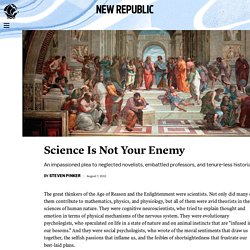
But one would be wrong. Though everyone endorses science when it can cure disease, monitor the environment, or bash political opponents, the intrusion of science into the territories of the humanities has been deeply resented. Just as reviled is the application of scientific reasoning to religion; many writers without a trace of a belief in God maintain that there is something unseemly about scientists weighing in on the biggest questions. We Don’t Know What We Are Talking About When We talk about Religion – Medium. People rarely mean the same thing when they say “religion”, nor do they realize that they don’t mean the same thing.
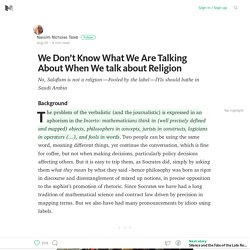
For early Jews and Muslims, religion was law. Din means law in Hebrew and religion in Arabic. For early Jews, religion was also tribal; for early Muslims, it was universal[i]. For the Romans, religion was social events, rituals, and festivals –the word religio was a counter to superstitio, and while present in the Roman zeitgeist had no equivalent concept in the Greek-Byzantine East[ii]. Law was procedurally and mechanically its own thing, and early Christianity, thanks to Saint Augustine, stayed relatively away from the law, and, later, remembering its foundations, had an uneasy relation with it. Can religion be based on ritual practice without belief? Since the dawn of anthropology, sociology and psychology, religion has been an object of fascination.
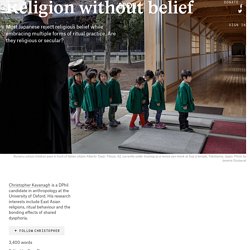
Founding figures such as Sigmund Freud, Émile Durkheim and Max Weber all attempted to dissect it, taxonomise it, and explore its psychological and social functions. And long before the advent of the modern social sciences, philosophers such as Xenophanes, Lucretius, David Hume and Ludwig Feuerbach have pondered the origins of religion.
In the century since the founding of the social sciences, interest in religion has not waned – but confidence in grand theorising about it has. Few would now endorse Freud’s insistence that the origins of religion are entwined with Oedipal sexual desires towards mothers. Dalai Lama tells his Facebook friends that religion "is no longer adequate" Well, he'd hardly be the first Buddhist to say something like this.
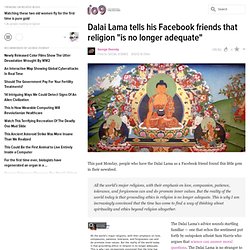
From what I've read, there are already lots of Buddhists, and historical Buddhist movements in various countries, who are atheistic and who prefer to return to Buddhism's roots as a kind of self-help, personal psychological and philosophical system—and yes, I realize I'm hugely oversimplifying that ideological stripe of Buddhism—and that's fine. And if this helps the world be a better place, cool. I'm all for it. But as an atheist I had already got to this point without making sand paintings, spinning prayer wheels or staring at stupas or rock gardens to shut off all mental processes and get to Satori. Maybe I'm just doing it wrong. What Does Buddhism Require? Back to God with Camille Paglia. Click to Listen to the Show (24 MB MP3) The route to a renaissance of the American fine arts lies through religion… When a society becomes all-consumed in the provincial minutiae of partisan politics, as has happened in the US over the past 20 years, all perspective is lost.

Great art can be made out of love for religion, as well as rebellion against it. Religion for Atheists by Alain de Botton: Building a Successful Case for Atheism 2.0? Ten Virtues for the Modern Age. The Virtues Project comes as a response to the wave of discussion and feedback that followed the publication of my book, Religion for Atheists, and a growing sense that being virtuous has become a strange and depressing notion, while wickedness and evil bask in a peculiar kind of glamour.
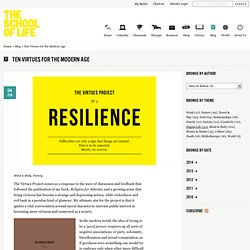
My ultimate aim for the project is that it ignites a vital conversation around moral character to increase public interest in becoming more virtuous and connected as a society. In the modern world, the idea of trying to be a ‘good person’ conjures up all sorts of negative associations: of piety, solemnity, bloodlessness and sexual renunciation, as if goodness were something one would try to embrace only when other more difficult but more fulfilling avenues had been exhausted. Throughout history, societies have been interested in fostering virtues, in training us to be more virtuous, but we're one of the first generations to have zero public interest in this. 1. BEYOND REDUCTIONISM: REINVENTING THE SACRED By Stuart A. Kauffman. Sam Harris on Spirituality without Religion, Happiness, and How to Cultivate the Art of Presence.
By Maria Popova “Our world is dangerously riven by religious doctrines that all educated people should condemn, and yet there is more to understanding the human condition than science and secular culture generally admit.”
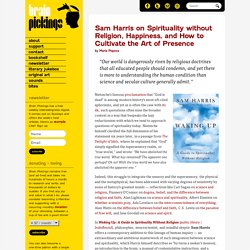
Sacred Science: Using Faith to Explain Anomalies in Physics. In the early 17th century a demon was loosed on the world by Italian mathematician Galileo Galilei when he began swinging pendulums, rolling balls down ramps and observing the moons of Jupiter—all with an aim toward discovering regularities that could be codified into laws of nature.
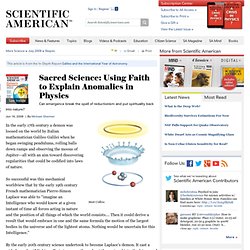
So successful was this mechanical worldview that by the early 19th century French mathematician Pierre-Simon Laplace was able to “imagine an Intelligence who would know at a given instant of time all forces acting in nature and the position of all things of which the world consists.... Then it could derive a result that would embrace in one and the same formula the motion of the largest bodies in the universe and of the lightest atoms. Nothing would be uncertain for this Intelligence.” By the early 20th century science undertook to become Laplace’s demon. Interview with David Bohm.
Secularism-A Short Film. Atheists More Motivated by Compassion than the Faithful. Atheists and agnostics are more driven by compassion to help others than are highly religious people, a new study finds.
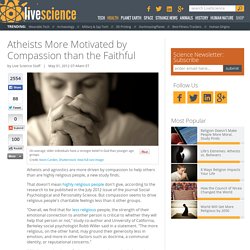
That doesn't mean highly religious people don't give, according to the research to be published in the July 2012 issue of the journal Social Psychological and Personality Science. But compassion seems to drive religious people's charitable feelings less than it other groups. "Overall, we find that for less religious people, the strength of their emotional connection to another person is critical to whether they will help that person or not," study co-author and University of California, Berkeley social psychologist Robb Willer said in a statement. Agnosticism. Agnostics and Agnosticism Sponsored link. Can an Agnostic also be an Atheist? Theists believe in the existence of a God, or a Goddess, or in multiple Gods, or multiple Goddesses or in a pantheon of Gods and Goddesses. Agnostics believe that the existence of a deity can neither be proven nor disproven. However, some Agnostics consider themselves to be Atheists . New Churches Focus on Building a Community Life.
Allison V. Smith for The New York Times The house band started a service one recent Sunday at the Life in Deep Ellum church in Dallas. Are you there, God? Christopher Hitchens Vs. Chris Hedges on Religion - Part 1/4. Where Do We Come From?: The 7 Most Intriguing Philosophical Arguments for the Existence of God. Photo Credit: Shutterstock.com/LilKar February 12, 2014 | Like this article?
Join our email list: Stay up to date with the latest headlines via email. Agnostic Richard Dawkins destroyed in debate by wiser Christian professor. Neil deGrasse Tyson: Atheist or Agnostic? Memo to atheists: God’s not dead yet. Sea of Faith - BBC documentary - Playlist. Professor Sapolsky Explains the Origin of Religion Part 1/2.
Investigating Wittgenstein, part 1: Falling in love. The need for new myths, rituals, symbols and authentic spirituality by Herman de Roos, Utrecht, Netherlands. Never in my life did I really fit in. Among others I was a professional soldier and a coordinator in logistic operations. People always wondered why I had chosen this kind of professions. This stopped after I gave up my career and went back to university in order to study interreligious spirituality. Somehow this seemed to fit with my personality. People stopped wondering and asking questions. Since I have started a new career in the area of spirituality I have written two books.
Humans want to give meaning to their lives. Humans want to give meaning to their lives Psychology teaches us that the human brain wants to experience live as orderly, integrated, meaningful and whole. Wittgenstein’s forgotten lesson. The Battle for Your Mind: Brainwashing Techniques Being Used On The Public By Dick Sutphen.
It Turns Out Colleges Aren't Actually Atheist Factories. Why Fundamentalism is Wrong. Lesley Hazleton: The doubt essential to faith. What Bill Nye and Ken Ham both get wrong. Creationism poll: How many Americans believe the Bible is literal, inerrant, or symbolic. Photo by Shutterstock In a dozen polls taken from 1982 to 2014, Gallup has asked Americans to choose among three views of evolution. AJ Jacobs: My year of living biblically. "The Church Doesn't Like the People to Grow Up."~ Bishop John Shelby Spong. Does Religion Cause Violence? The Diversity of Islam - NYTimes.com. Atheism, Islam and liberalism: This is what we are really fighting about. Why Richard Dawkins, Sam Harris and the 'New Atheists' Aren't Really Atheists. Islamophobia and a Challenge to Bill Maher - Deepa Kumar on Reality Asserts Itself (1/5) Children of the Caliphate. Jesus Camp part 1 of 8 (MrMoleqular)
Belief-O-Matic. The World Religions Tree - Infographics. The Jefferson Bible. The Gospel in Brief. Ancient Confession Found: 'We Invented Jesus Christ' Did the historical Jesus exist? A growing number of scholars don’t think so. The Christ of India. Historian Says Piece of Papyrus Refers to Jesus’ Wife. Jay Michaelson: When Jesus Healed a Same-Sex Partner. Gregg Braden - The 7 Essene Mirrors.
The Ritual of Circumcision. Laura Sevier: When God Was a Woman. Benefits of Circumcision Outweigh Risks, Pediatric Group Says.